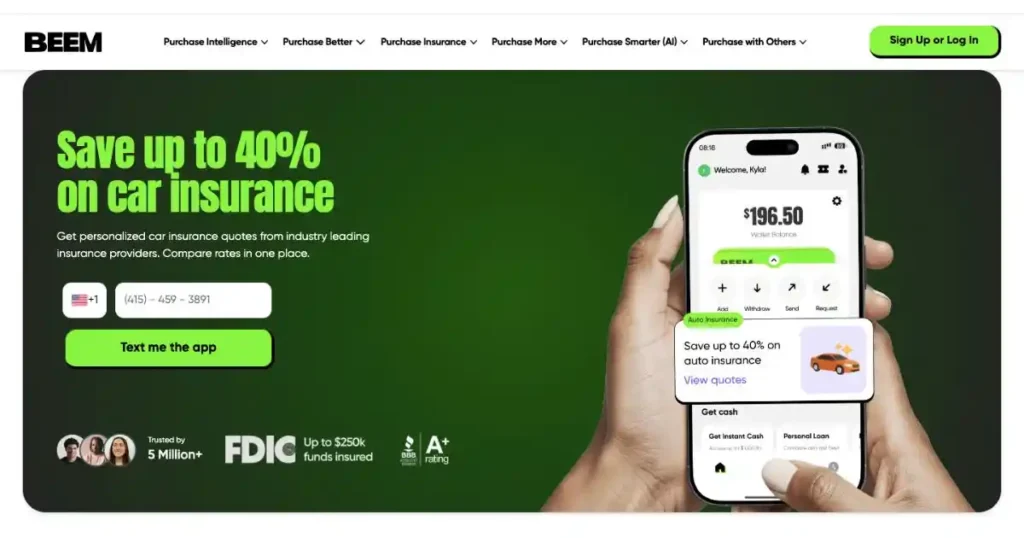Delivering food, driving for Uber, or running your own business? Your car insurance needs aren’t the same as everyone else’s. Car insurance for a self-employed individual requires special consideration because your vehicle is crucial to your livelihood as a self-employed individual or gig worker.
Whether you’re transporting passengers, delivering goods, or meeting clients, the nature of your driving differs from a typical commuter. Many gig workers and self-employed individuals rely on personal vehicles for work, but standard car insurance may not cover work-related use.
What Makes Self-Employed and Gig Workers Different When It Comes to Car Insurance?
When combining personal and business use of your vehicle, standard personal auto insurance may not provide adequate coverage for work-related activities. Gig driving involves higher risks and increased mileage, distinguishing it from regular commuting. Specialized insurance is essential to protect against potential gaps in coverage.
Mixing Personal and Business Use of Your Vehicle
Many self-employed individuals or gig workers use their vehicles for personal and business purposes. Personal auto insurance policies are designed to cover typical driving—commuting, running errands, and other individual activities. However, once you start using your vehicle for work, such as picking up passengers or delivering goods, personal car insurance may not provide adequate coverage.
Insurance companies often exclude claims related to business use or only cover limited situations, exposing you to significant risks. Knowing when your insurance will not suffice is vital to ensure you’re adequately protected.
Why Gig Driving Isn’t the Same as Commuting
Gig driving is different from typical commuting in several essential ways. Rideshare drivers, delivery workers, and others who use their vehicles for business often put additional miles on their cars, face more driving hazards, and have a higher risk of accidents than average commuters.
Whether you’re providing rides, delivering food, or driving to meetings, the nature of your driving increases the potential for an accident. Standard personal policies often don’t extend to these activities, so specialized coverage is necessary to protect yourself and your vehicle while on the job.
Read related blogs: Is Usage-Based Car Insurance Right for You?
Why Personal Car Insurance Might Not Be Enough
Using your vehicle for business can lead to denied claims and significant financial and legal liabilities, as personal car insurance typically excludes business-related activities.
Risk of Denied Claims
If you’re involved in an accident while driving for work, your personal car insurance may not cover the damages or injuries. Many insurers deny your claim outright if they discover you were driving for business purposes. Most personal car insurance policies exclude coverage for business-related driving or limit it to specific situations. Without the right coverage, you could pay out-of-pocket for repairs, medical bills, and legal fees that would otherwise be covered.
Legal and Financial Liability
Without the proper insurance coverage, you could face serious legal and financial consequences if you’re involved in a work-related accident. For example, if you cause injury or damage to another person or their property while working, you could be held personally liable for the costs.
Without business or commercial insurance, you may have to cover the damages out of your pocket, which could result in bankruptcy or other financial challenges. Ensuring your policy covers the additional risks of driving for work is crucial.
Who Needs Specialized or Additional Coverage?
As a self-employed individual or gig worker, determining the appropriate car insurance coverage is crucial to protect yourself and your business. Depending on your specific activities, specialized or additional coverage may be necessary.
Rideshare Drivers (Uber, Lyft)
Rideshare drivers face unique insurance challenges. Most rideshare platforms, like Uber and Lyft, offer limited insurance coverage, but only when you have a passenger in your car. It means you are responsible for ensuring adequate coverage when waiting for or transporting passengers.
A rideshare coverage endorsement or specialized rideshare insurance will fill in the gaps and provide protection when you’re actively working but not yet matched with a rider.
Delivery Drivers (DoorDash, Instacart, Amazon Flex)
Delivery drivers often operate in high-risk environments, transporting goods and driving long distances. Many delivery apps provide some level of insurance, but it’s usually limited. Some delivery drivers may require commercial or hybrid coverage to fill the gap between personal auto insurance and the insurance offered by their delivery platform. If you’re a delivery driver, you must ensure that your policy covers your work, from picking up the goods to making deliveries.
Freelancers Using Vehicles for Work
Freelancers in various industries—like real estate agents, photographers, or mobile technicians—may also need specialized car insurance if they use their vehicles for business. Personal car insurance typically won’t cover these business activities.
You may need to add a business-use endorsement to your policy or purchase a commercial vehicle policy to ensure you’re fully protected during work-related driving.
Read related blogs: How Weather Affects Your Car Insurance Rates in the U.S.
When Should You Upgrade or Adjust Your Policy?
Knowing when to upgrade or adjust your car insurance policy is key to ensuring you’re always covered as your work situation evolves. Here’s when you should take action to ensure your coverage stays in line with your needs.
Before You Start Using Your Car for Work
Before incorporating your vehicle into your work routine, it’s essential to inform your insurance provider about your intended business use. Many personal auto insurance policies offer limited coverage for business-related activities, and failing to disclose such usage can lead to denied claims or even policy cancellations if an accident occurs during work-related driving.
Open communication with your insurer allows you to adjust your policy appropriately, ensuring coverage from the outset. This proactive approach helps prevent financial hardships, protects your vehicle, and serves your professional needs.
At Policy Renewal or Job Change
When your insurance policy is up for renewal or your employment circumstances change, it’s an ideal time to review and adjust your coverage. A new job with a shorter commute or the option to work from home may qualify you for lower rates. In comparison, a longer commute or increased business-related driving could necessitate higher coverage levels.
Additionally, some professions may be eligible for specific discounts, so it’s beneficial to inquire about such opportunities. Comparing quotes from different insurers during this period can help ensure you receive the best coverage at the most competitive price. Regularly updating your insurance to reflect your current employment situation and driving habits can lead to significant savings and ensure adequate protection.
Where Can You Find the Right Car Insurance for a Self-Employed or Gig Workers?
Finding the right insurance for your gig work or self-employment is crucial for ensuring you’re adequately covered without paying unnecessary premiums. Here are some ways to explore the best options tailored to your needs.
Use Beem to Compare Rideshare and Business Use-Friendly Policies
Beem is an excellent tool to help self-employed individuals and gig workers compare insurance policies tailored to their needs. Whether you’re a rideshare driver, delivery worker, or freelancer, Beem allows you to filter insurance quotes to find insurers who explicitly offer policies that cover business use. It ensures you get the proper protection without paying for coverage you don’t need.
Consider Insurers with Specialized Add-Ons or Hybrid Policies
Some insurers offer add-ons or hybrid policies covering personal and business use. These can be a cost-effective alternative to full commercial insurance, which may not be necessary for all gig workers. Look for policies that offer rideshare endorsements or business-use add-ons, as they are specifically designed for people who use their vehicles for work-related purposes. These policies often provide the flexibility you need without the expense of a full commercial policy.
How to Get Covered Without Overpaying
Finding coverage that fits your needs without overpaying is key to getting the right car insurance as a gig worker or self-employed individual. Here’s how to ensure you’re covered while keeping your costs manageable.
Step 1: Be Honest About Your Driving Habits
Transparency with your insurance provider is essential when using your vehicle for work-related activities. Whether driving for ridesharing, deliveries, or business meetings, disclosing this information ensures that your policy accurately reflects your usage. Failing to inform your insurer about business use can lead to denied claims or policy cancellations if an incident occurs during work-related driving.
Most personal auto insurance policies exclude or limit coverage for business-related activities to specific situations. Being upfront allows your insurer to assess your needs appropriately and recommend any necessary endorsements or adjustments to your policy. This proactive approach helps avoid unexpected expenses and ensures you’re adequately protected while on the job.
Step 2: Choose the Right Coverage Type
Selecting appropriate car insurance coverage is crucial for self-employed individuals and gig workers, as personal auto policies may not provide sufficient protection during work-related activities. Depending on your specific usage, consider the following coverage options:
Personal Policy with Business-Use Endorsement
If you occasionally use your vehicle for business purposes, such as attending client meetings or making deliveries, adding a business-use endorsement to your auto policy can extend coverage. This endorsement ensures you’re protected during work-related driving without needing a separate commercial policy.
Rideshare Coverage
Specialized rideshare insurance is essential for those driving full-time with rideshare platforms like Uber or Lyft. This coverage fills the gap between your auto insurance and the coverage provided by the rideshare company, offering protection during periods when the app is on but you haven’t accepted a ride.
Full Commercial Policy
A full commercial auto policy is necessary if your vehicle is primarily used for business activities, such as operating a delivery service or transporting clients. This policy provides comprehensive coverage, including liability, collision, and medical expenses, tailored to the demands of business use.
Step 3: Compare Quotes with Beem
Navigating the landscape of car insurance can be daunting, but Beem streamlines the process by allowing you to compare personalized quotes from leading insurance providers. By leveraging Beem’s user-friendly platform, you can input your specific driving habits and preferences to receive tailored coverage options that align with your needs. This approach saves you time and ensures you secure the most competitive rates.
Moreover, Beem’s partnerships with reputable insurers provide access to exclusive discounts, potentially reducing your premiums further. Utilizing Beem’s comparison tool empowers you to make informed decisions, balancing comprehensive coverage with affordability. By actively engaging with Beem, you can confidently navigate the complexities of car insurance, ensuring your vehicle is protected without overpaying.
Step 4: Bundle or Adjust Deductibles to Save
Bundling policies and adjusting deductibles can reduce your car insurance premiums. Combining your auto insurance with other policies, such as homeowners’ or renters’ insurance, can lead to discounts ranging from 5% to 25%. Additionally, increasing your deductible—the out-of-pocket amount before insurance coverage kicks in—can lower your premium.
For instance, raising your deductible from $200 to $500 could reduce your collision and comprehensive coverage costs by 15% to 30%, and increasing it to $1,000 can save you 40% or more. However, ensuring sufficient funds to cover the higher deductible in case of a claim is essential. You can effectively manage and reduce car insurance expenses by strategically bundling policies and adjusting deductibles.
Final Thoughts – Protect Yourself While You Hustle
As the gig economy expands, many insurance options are emerging to cater to self-employed workers’ unique needs. It’s no longer necessary to choose between comprehensive coverage and affordability. By proactively comparing insurance options, utilizing tools like Beem, and making informed decisions, you can safeguard yourself and your business while managing costs.
Ensuring you have the appropriate coverage protects you financially and provides peace of mind, allowing you to focus on your work without undue concern about potential risks.
Need Insurance That Covers the Way You Work?
Use Beem to compare insurance options built for gig workers and the self-employed. Take control of your coverage today! Download Beem now.















































